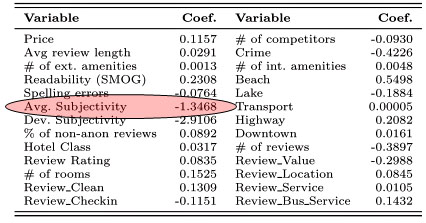A recent paper about which features are most important to travelers shopping for a hotel online concludes that the answer is “proximity to a beach.” Unfortunately, says Felix Salmon, a hotel can’t do much about that:
What they can do is address the second-most important variable: readability. Just having well-written reviews, it turns out, is much more important than having good reviews: the rating given in the review was much less significant, as were aspects of the review relating to cleanliness, check-in, service, and the like….So Zappo’s, instead of getting people to write good reviews, just got them to fix reviews which already existed — deal with spelling errors, correct grammar, that kind of thing. And anecdotally [], Zappo’s saw a “substantial” improvement as a result of its investment in cleaning up such things.
Zappo’s is a shoe company, not a hotel, but they figured that if readability of online reviews made a hotel more desirable, then it  might make shoes more desirable too. And apparently they were right.
might make shoes more desirable too. And apparently they were right.
But take another look at the table of important variables, which I clipped from the paper. The highest positive correlation indeed goes to beaches and the second highest goes to review readability. But there’s more to life than positive correlations: the highest correlation of all — by a mile — is review “subjectivity.” In other words, people hated it when reviews were just personal stories or vague declarations that a hotel was great. And if there’s a negative correlation for subjectivity, that means there should be a positive correlation for the opposite of subjectivity. And indeed there is. From the paper: “The negative sign on subjectivity means that customers are positive in?uenced by reviews that describe factual characteristics of hotels, and do not want to read personal stories of reviewers.”
So if you want to game online reviews, don’t worry too much about paying Indian sweatshop workers a few rupees each to write phony positive reviews for your product. Instead, pay them a few rupees each to write lots of simple, factual reviews. If you can hire workers with good English skills, that’s a bonus, but the main thing is to remember Joe Friday’s advice: “Just the facts, ma’am.”
And for the record: Unlike Felix, who isn’t sure what he thinks about what Zappo’s is doing, I don’t think that paying workers to “clean up” other people’s reviews even comes within light years of being ethical. You just don’t change other people’s words without getting their permission, especially when it’s for the sole purpose of duping shoppers into thinking that Zappo’s customers are a bit tonier than they really are. In fact, I’d say that creating phony but purely factual reviews is probably a step higher on the ethics scale. If Zappo’s is under the impression that this is perhaps clever but still entirely kosher, they have a very strange moral compass in their executive suite. If their review “cleanup” ever becomes common knowledge, I’m pretty sure they’ll be forced to back down and apologize mighty quickly.

















